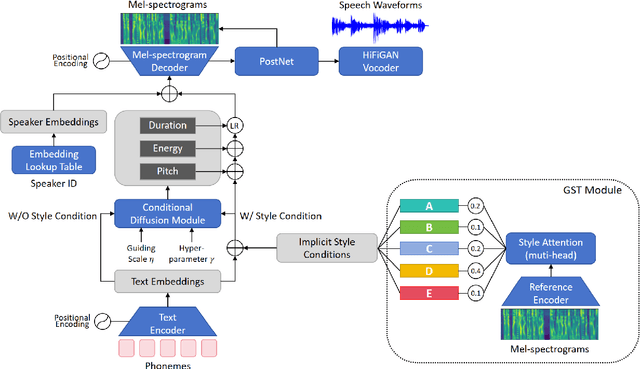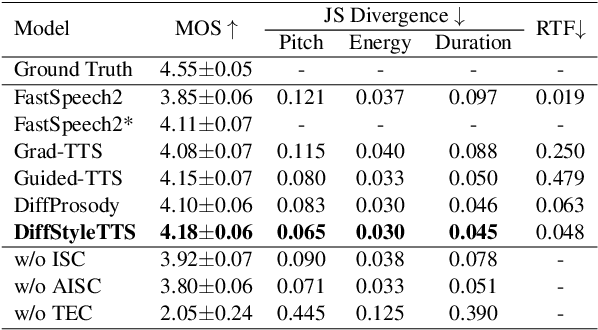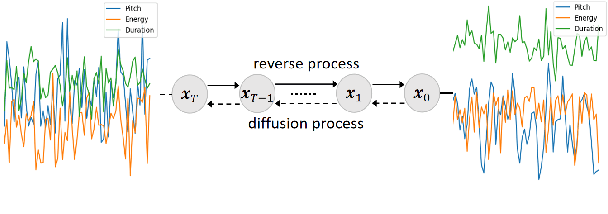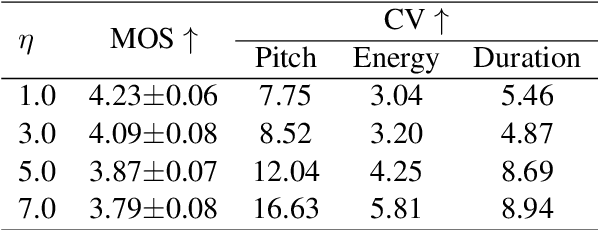Jiaxuan Liu
ERNIE 5.0 Technical Report
Feb 04, 2026Abstract:In this report, we introduce ERNIE 5.0, a natively autoregressive foundation model desinged for unified multimodal understanding and generation across text, image, video, and audio. All modalities are trained from scratch under a unified next-group-of-tokens prediction objective, based on an ultra-sparse mixture-of-experts (MoE) architecture with modality-agnostic expert routing. To address practical challenges in large-scale deployment under diverse resource constraints, ERNIE 5.0 adopts a novel elastic training paradigm. Within a single pre-training run, the model learns a family of sub-models with varying depths, expert capacities, and routing sparsity, enabling flexible trade-offs among performance, model size, and inference latency in memory- or time-constrained scenarios. Moreover, we systematically address the challenges of scaling reinforcement learning to unified foundation models, thereby guaranteeing efficient and stable post-training under ultra-sparse MoE architectures and diverse multimodal settings. Extensive experiments demonstrate that ERNIE 5.0 achieves strong and balanced performance across multiple modalities. To the best of our knowledge, among publicly disclosed models, ERNIE 5.0 represents the first production-scale realization of a trillion-parameter unified autoregressive model that supports both multimodal understanding and generation. To facilitate further research, we present detailed visualizations of modality-agnostic expert routing in the unified model, alongside comprehensive empirical analysis of elastic training, aiming to offer profound insights to the community.
PaddleOCR-VL-1.5: Towards a Multi-Task 0.9B VLM for Robust In-the-Wild Document Parsing
Jan 29, 2026Abstract:We introduce PaddleOCR-VL-1.5, an upgraded model achieving a new state-of-the-art (SOTA) accuracy of 94.5% on OmniDocBench v1.5. To rigorously evaluate robustness against real-world physical distortions, including scanning, skew, warping, screen-photography, and illumination, we propose the Real5-OmniDocBench benchmark. Experimental results demonstrate that this enhanced model attains SOTA performance on the newly curated benchmark. Furthermore, we extend the model's capabilities by incorporating seal recognition and text spotting tasks, while remaining a 0.9B ultra-compact VLM with high efficiency. Code: https://github.com/PaddlePaddle/PaddleOCR
FunCineForge: A Unified Dataset Toolkit and Model for Zero-Shot Movie Dubbing in Diverse Cinematic Scenes
Jan 21, 2026Abstract:Movie dubbing is the task of synthesizing speech from scripts conditioned on video scenes, requiring accurate lip sync, faithful timbre transfer, and proper modeling of character identity and emotion. However, existing methods face two major limitations: (1) high-quality multimodal dubbing datasets are limited in scale, suffer from high word error rates, contain sparse annotations, rely on costly manual labeling, and are restricted to monologue scenes, all of which hinder effective model training; (2) existing dubbing models rely solely on the lip region to learn audio-visual alignment, which limits their applicability to complex live-action cinematic scenes, and exhibit suboptimal performance in lip sync, speech quality, and emotional expressiveness. To address these issues, we propose FunCineForge, which comprises an end-to-end production pipeline for large-scale dubbing datasets and an MLLM-based dubbing model designed for diverse cinematic scenes. Using the pipeline, we construct the first Chinese television dubbing dataset with rich annotations, and demonstrate the high quality of these data. Experiments across monologue, narration, dialogue, and multi-speaker scenes show that our dubbing model consistently outperforms SOTA methods in audio quality, lip sync, timbre transfer, and instruction following. Code and demos are available at https://anonymous.4open.science/w/FunCineForge.
PaddleOCR-VL: Boosting Multilingual Document Parsing via a 0.9B Ultra-Compact Vision-Language Model
Oct 16, 2025Abstract:In this report, we propose PaddleOCR-VL, a SOTA and resource-efficient model tailored for document parsing. Its core component is PaddleOCR-VL-0.9B, a compact yet powerful vision-language model (VLM) that integrates a NaViT-style dynamic resolution visual encoder with the ERNIE-4.5-0.3B language model to enable accurate element recognition. This innovative model efficiently supports 109 languages and excels in recognizing complex elements (e.g., text, tables, formulas, and charts), while maintaining minimal resource consumption. Through comprehensive evaluations on widely used public benchmarks and in-house benchmarks, PaddleOCR-VL achieves SOTA performance in both page-level document parsing and element-level recognition. It significantly outperforms existing solutions, exhibits strong competitiveness against top-tier VLMs, and delivers fast inference speeds. These strengths make it highly suitable for practical deployment in real-world scenarios.
UDDETTS: Unifying Discrete and Dimensional Emotions for Controllable Emotional Text-to-Speech
May 15, 2025Abstract:Recent neural codec language models have made great progress in the field of text-to-speech (TTS), but controllable emotional TTS still faces many challenges. Traditional methods rely on predefined discrete emotion labels to control emotion categories and intensities, which can't capture the complexity and continuity of human emotional perception and expression. The lack of large-scale emotional speech datasets with balanced emotion distributions and fine-grained emotion annotations often causes overfitting in synthesis models and impedes effective emotion control. To address these issues, we propose UDDETTS, a neural codec language model unifying discrete and dimensional emotions for controllable emotional TTS. This model introduces the interpretable Arousal-Dominance-Valence (ADV) space for dimensional emotion description and supports emotion control driven by either discrete emotion labels or nonlinearly quantified ADV values. Furthermore, a semi-supervised training strategy is designed to comprehensively utilize diverse speech datasets with different types of emotion annotations to train the UDDETTS. Experiments show that UDDETTS achieves linear emotion control along the three dimensions of ADV space, and exhibits superior end-to-end emotional speech synthesis capabilities.
DiffStyleTTS: Diffusion-based Hierarchical Prosody Modeling for Text-to-Speech with Diverse and Controllable Styles
Dec 04, 2024



Abstract:Human speech exhibits rich and flexible prosodic variations. To address the one-to-many mapping problem from text to prosody in a reasonable and flexible manner, we propose DiffStyleTTS, a multi-speaker acoustic model based on a conditional diffusion module and an improved classifier-free guidance, which hierarchically models speech prosodic features, and controls different prosodic styles to guide prosody prediction. Experiments show that our method outperforms all baselines in naturalness and achieves superior synthesis speed compared to three diffusion-based baselines. Additionally, by adjusting the guiding scale, DiffStyleTTS effectively controls the guidance intensity of the synthetic prosody.
AppAgent: Multimodal Agents as Smartphone Users
Dec 22, 2023



Abstract:Recent advancements in large language models (LLMs) have led to the creation of intelligent agents capable of performing complex tasks. This paper introduces a novel LLM-based multimodal agent framework designed to operate smartphone applications. Our framework enables the agent to operate smartphone applications through a simplified action space, mimicking human-like interactions such as tapping and swiping. This novel approach bypasses the need for system back-end access, thereby broadening its applicability across diverse apps. Central to our agent's functionality is its innovative learning method. The agent learns to navigate and use new apps either through autonomous exploration or by observing human demonstrations. This process generates a knowledge base that the agent refers to for executing complex tasks across different applications. To demonstrate the practicality of our agent, we conducted extensive testing over 50 tasks in 10 different applications, including social media, email, maps, shopping, and sophisticated image editing tools. The results affirm our agent's proficiency in handling a diverse array of high-level tasks.
DroidBot-GPT: GPT-powered UI Automation for Android
Apr 14, 2023Abstract:This paper introduces DroidBot-GPT, a tool that utilizes GPT-like large language models (LLMs) to automate the interactions with Android mobile applications. Given a natural language description of a desired task, DroidBot-GPT can automatically generate and execute actions that navigate the app to complete the task. It works by translating the app GUI state information and the available actions on the smartphone screen to natural language prompts and asking the LLM to make a choice of actions. Since the LLM is typically trained on a large amount of data including the how-to manuals of diverse software applications, it has the ability to make reasonable choices of actions based on the provided information. We evaluate DroidBot-GPT with a self-created dataset that contains 33 tasks collected from 17 Android applications spanning 10 categories. It can successfully complete 39.39% of the tasks, and the average partial completion progress is about 66.76%. Given the fact that our method is fully unsupervised (no modification required from both the app and the LLM), we believe there is great potential to enhance automation performance with better app development paradigms and/or custom model training.
 Add to Chrome
Add to Chrome Add to Firefox
Add to Firefox Add to Edge
Add to Edge